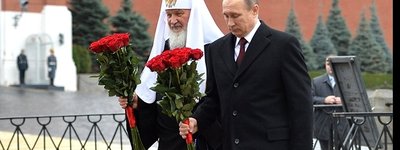Autocephaly: Who Decides?
Since when does Moscow, rather than the Ecumenical Patriarchate, have the right to create new Churches, to insist that they are the only canonical Orthodox Churches of countries beyond Russia, to maintain jurisdiction over them, and to reserve for itself the right to grant or deny them autocephaly?
Visiting Athens last June, Metropolitan Hilarion of Volokolamsk, head of the Moscow Patriarchate’s Department of External Church Relations, gave an interview to the Greek Romfea news agency. He mentioned that he was to meet with Archbishop Ieronymos of Athens and all Greece. The first point of his agenda that he mentioned in the interview was to tell the archbishop about the situation in Ukraine. There, according to Hilarion, the Ukrainian schismatics, government, and the “uniates” (Greco-Catholics) had conspired against the canonical Ukrainian Orthodox Church (Moscow Patriarchate) by demanding that the Ecumenical Patriarchate recognize a single autocephalous Orthodox Church in Ukraine. Evidently, Metropolitan Hilarion is very eager to make sure the Greek Orthodox Church is on his side in the dispute.
In the interview, Hilarion declared that the episcopate, clergy and laity of the UOC (MP) are opposed to the creation of a single autocephalous Orthodox Church in Ukraine. This, he claimed, was evident at their June 25 conference of bishops. But could a conference of bishops fully represent the opinions of their clergy, and especially of their laity?
Asked about the recent visit of a large UOC (MP) delegation, including four metropolitans, to the Ecumenical Patriarchate in Istanbul, Metropolitan Hilarion stated that it had met with Ecumenical Patriarch Bartholomew and with three bishops of the synod – Metropolitan John of Pergamon, Metropolitan Emmanuel of France, and Metropolitan Bartholomew of Smyrna. They had discussed the “schism” in Ukraine and the Ukrainian request that Patriarch Bartholomew grant autocephaly to a single Orthodox Church in that country.
According to Hilarion, Metropolitan John of Pergamon referred to archival research which showed that in 1685-1686, the Metropolitanate of Kyiv had indeed been transferred to the Moscow Patriarchate. He rejected the claim of the Ukrainian autocephalists that the decision had been merely to permit the Kyivan metropolitan to be installed in Moscow while remaining under Constantinople, and that this was for a limited time only. Metropolitan Hilarion pointed out that the patriarch of Constantinople has never challenged the subordination of the Kyivan see to Moscow.
Moreover, he argued, the Kievan Metropolitanate of 1686 was much smaller than today’s: it did not include Odessa, Donetsk, or the Crimea. Today’s UOC is a “completely different territory.” (press release of the Moscow Patriarchate of June 27, cited in SEIA no. 273, June 30, p. 10)
Indeed it is; in 1686, neither Odessa nor Donetsk had been founded, and Crimea was under the Ottomans’ Tatar vassals. But why did Hilarion point out that today’s UOC (MP) is territorially distinct from the Kyivan Metropolitanate of 1686? Perhaps he was insuring himself against the possibility that the transfer of 1686 might turn out to have been conditional, or even invalid, after all. In that case, he could argue that this is irrelevant, as today’s Kyivan Metropolitanate is not the same entity as that of 1686. But he would then have to prove that the contemporary UOC’s subordination to Moscow is legitimate. That the Ecumenical Patriarch has not challenged it is hardly proof.
There have been, in fact, several interruptions in the history of the Metropolitanate of Kyiv: 1718-1722, 1731-1743, 1929-1934, and 1937-1941. Its territory fluctuated. Furthermore, today’s Ukrainian Orthodox Church was formed unilaterally by the Russian Orthodox Church in October 1990 from its Exarchate for Ukraine. Since when does Moscow, rather than the Ecumenical Patriarchate, have the right to create new Churches, to insist that they are the only canonical Orthodox Churches of countries beyond Russia, to maintain jurisdiction over them, and to reserve for itself the right to grant or deny them autocephaly?
Strictly speaking, neither the UOC of today nor the ROC of today existed in 1686. As Hilarion points out, the UOC’s present territory is different from that of the Kyivan Metropolitanate of the seventeenth century; similarly, the Russian Church’s territory today is quite different from that of the 1680s. Does that make them essentially different entities from their predecessors? There are other, more compelling reasons to reach that conclusion. The Moscow Patriarchate was abolished by Peter the Great in 1721 and replaced by the Holy Synod. It was revived in 1918 but destroyed in the 1920s. The present Moscow Patriarchate was formed, uncanonically, by the initiative of Joseph Stalin in 1943; its Council of 1945 gave it canonical status. If the Moscow Patriarchate that was revived or created in 1918, or 1943, or 1945 is not the Moscow Patriarchate that existed in 1686, and the Kyivan metropolitanate of today is not the entity that was purportedly transferred in that year, then that transfer does not compel us to regard the latter as a part of the former. In that case, Moscow has no say in the matter of the autocephaly of the Ukrainian Orthodox Church.










